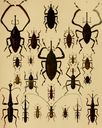Pachymerina
Pachymerina
Classification
- Phylum: Arthropoda
- Subphylum: Hexapoda
- Class: Insecta
- Order: Coleoptera
- Suborder: Polyphaga
- Superfamily: Chrysomeloidea
- Family: Chrysomelidae
- Subfamily: Bruchinae
- Tribe: Pachymerini
- Subtribe: Pachymerina
Pronunciation
How to pronounce Pachymerina: /ˌpækɪməˈraɪnə/
These audio files are automatically generated. While they are not always 100% accurate, they are a good starting point.
Images





Summary
Pachymerina is a subtribe of bean weevils or seed beetles within the family Chrysomelidae, characterized by their seed-infesting habits and compact, oval morphology. They are important granivores and pests in many agricultural settings.
Physical Characteristics
Bean weevils are generally compact and oval in shape, with small heads somewhat bent under. Sizes range from 1 to 22 mm. Colors are usually black or brown, often with mottled patterns. The elytra are short, not quite reaching the tip of the abdomen.
Identification Tips
Look for their compact, oval shape and distinctive short elytra which do not cover the entire abdomen. Their mandibles may be elongated, but they do not have the long snouts characteristic of true weevils.
Habitat
Bean weevils typically infest various kinds of seeds or beans, living most of their lives inside a single seed. Host plants tend to be legumes, and they are also found in Convolvulaceae, Arecaceae, and Malvaceae.
Distribution
Found worldwide, with several species native to Great Britain. Some species are introduced and proliferate in heated buildings in temperate climates.
Diet
Granivorous; they infest and feed on seeds.
Life Cycle
Adults deposit eggs on seeds, and larvae chew their way into the seed. Upon maturing, larvae cut an exit hole and return to their feeding chamber to pupate.
Reproduction
Females lay eggs directly on seeds where larvae will later feed.
Ecosystem Role
As granivores, they play a role in seed predation and are considered pests in agricultural contexts.
Economic Impact
Several species are considered pests, especially in stored products.
Collecting Methods
- Hand collection from host plants
- Light traps
Preservation Methods
- Drying
- Freezing
- Ethanol preservation
Misconceptions
Though common names refer to them as weevils, they do not possess the long snouts characteristic of true weevils.
Tags
- Pachymerina
- bean weevils
- seed beetles
- Chrysomelidae
- granivores